外研版九年级下册 Module 3 Life now and then Unit 3课件(共41张PPT)
文档属性
| 名称 | 外研版九年级下册 Module 3 Life now and then Unit 3课件(共41张PPT) |
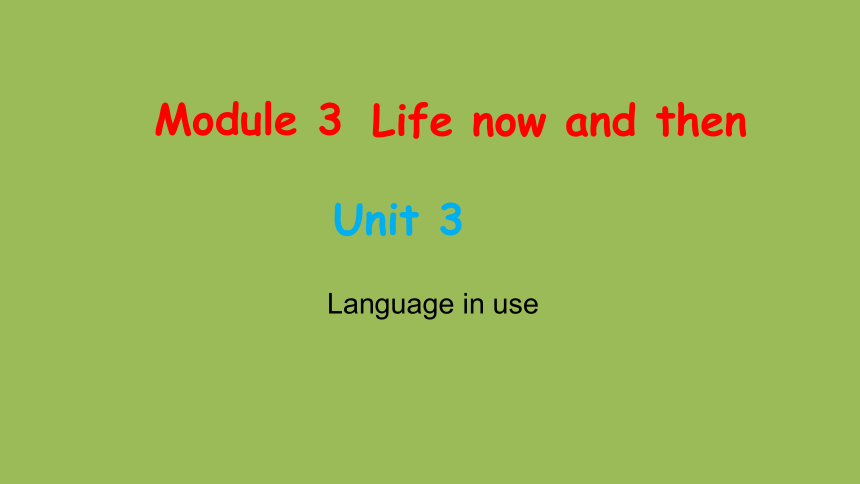
|
|
| 格式 | pptx | ||
| 文件大小 | 148.7KB | ||
| 资源类型 | 教案 | ||
| 版本资源 | 外研版 | ||
| 科目 | 英语 | ||
| 更新时间 | 2023-04-26 00:00:00 | ||
图片预览

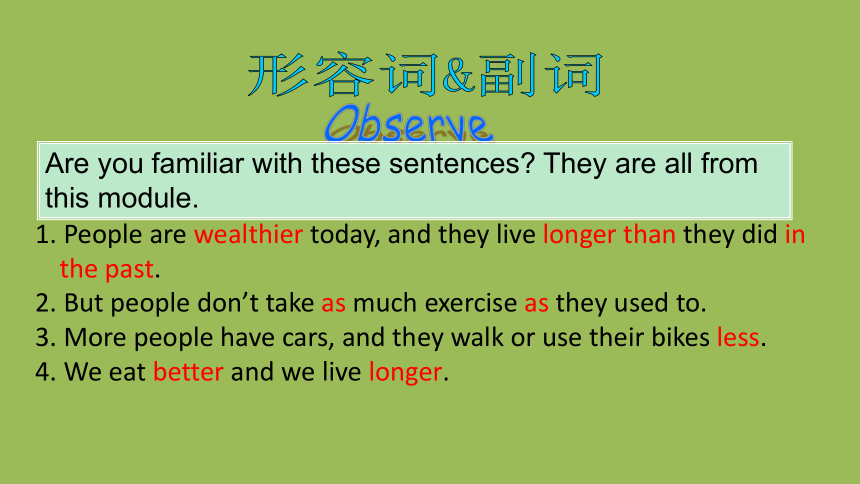
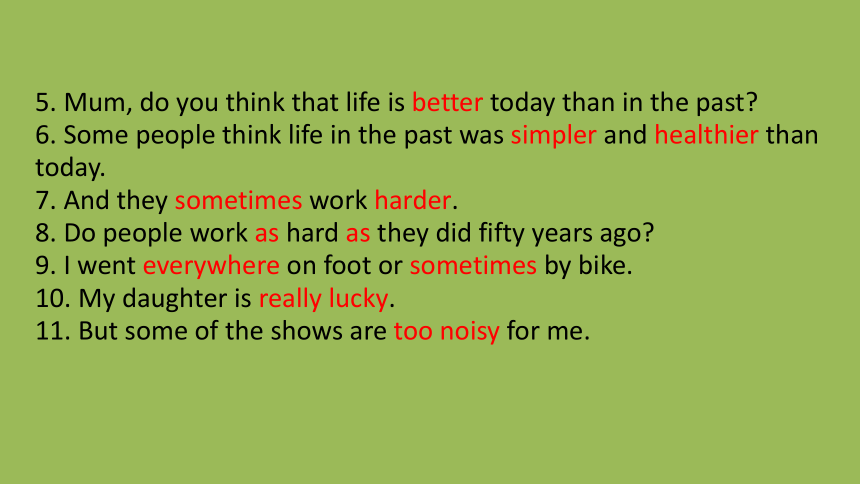
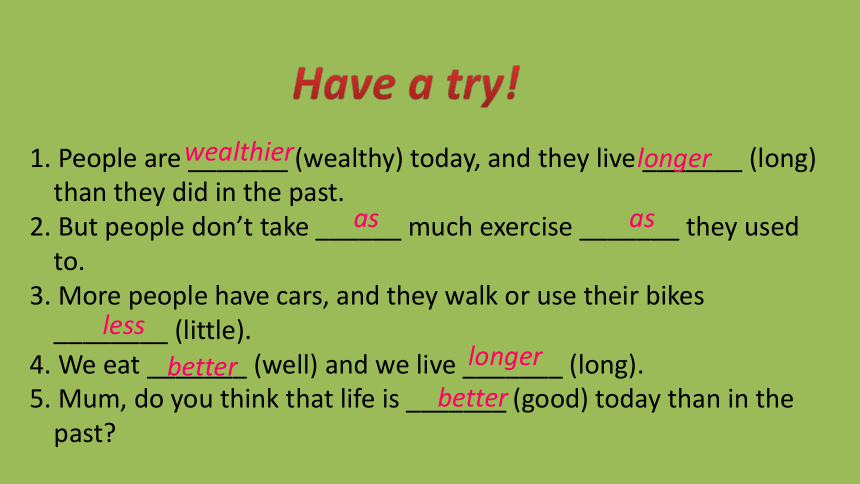
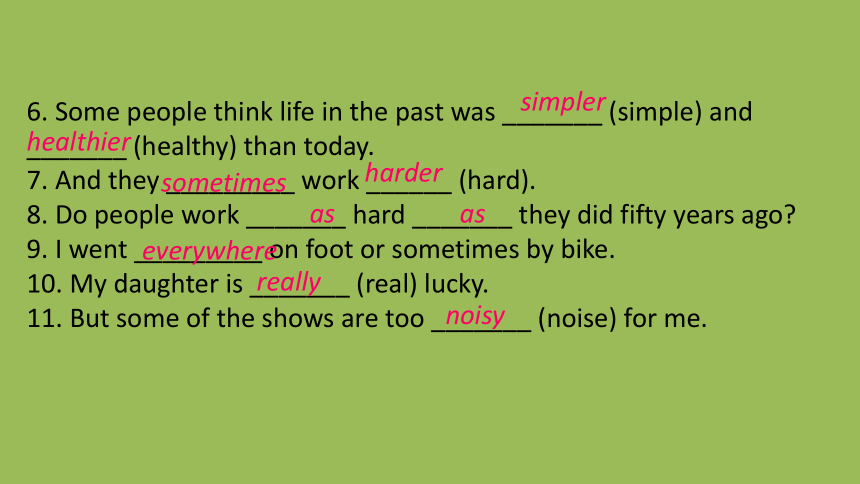
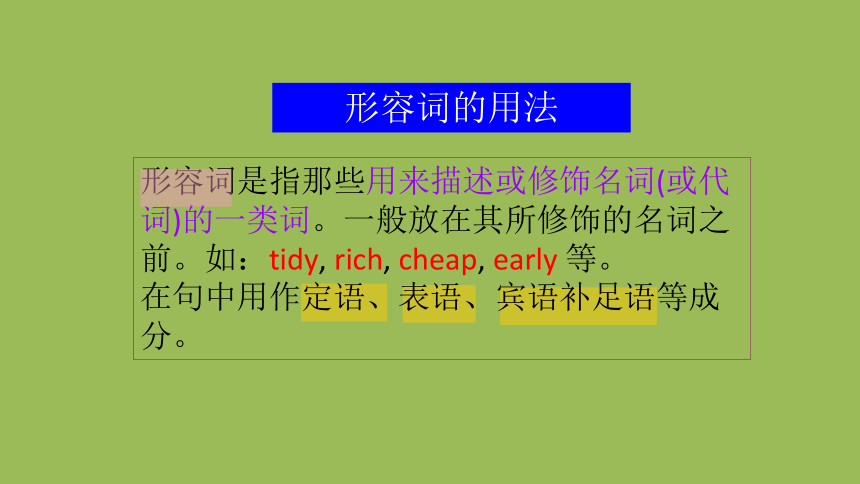
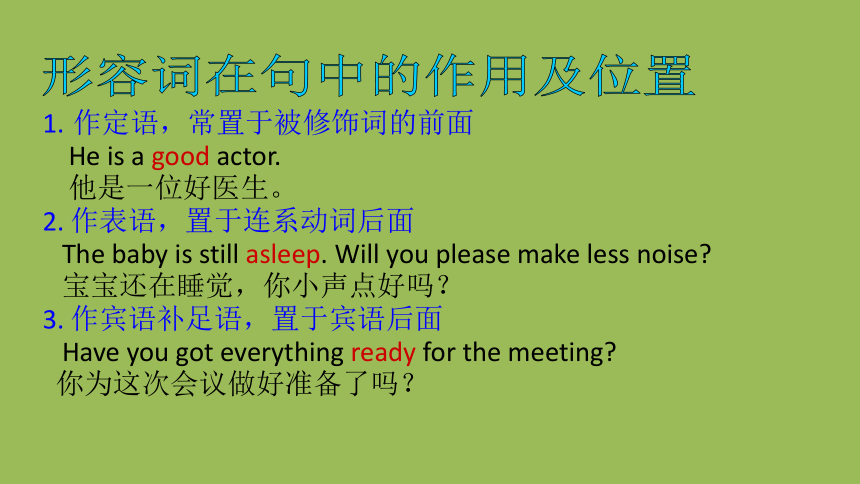
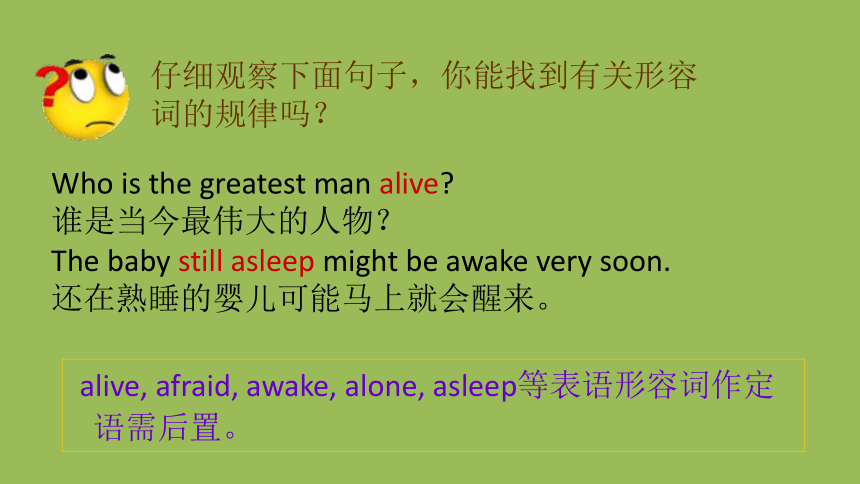
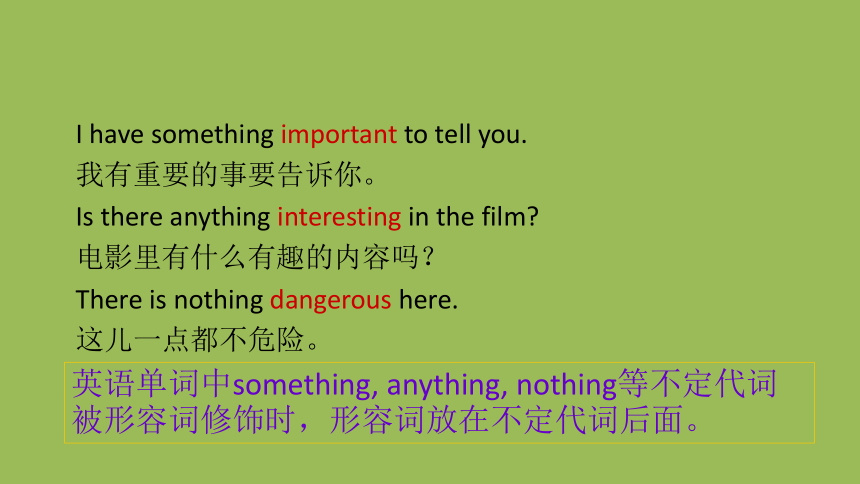
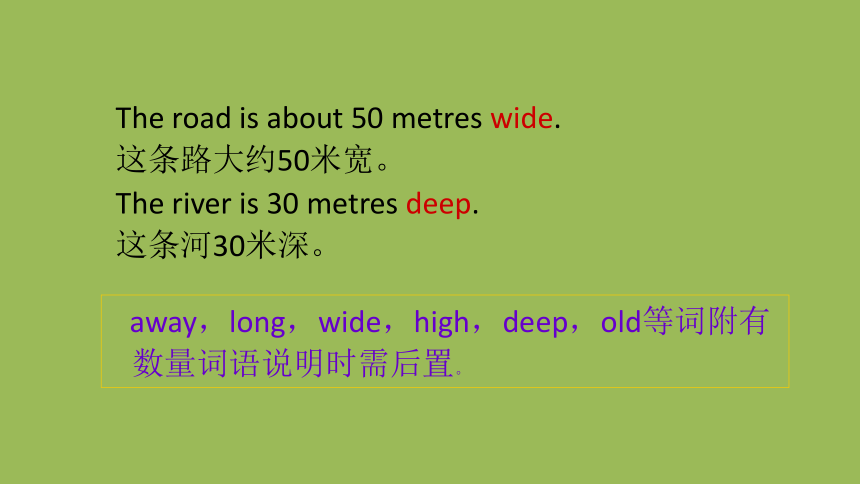
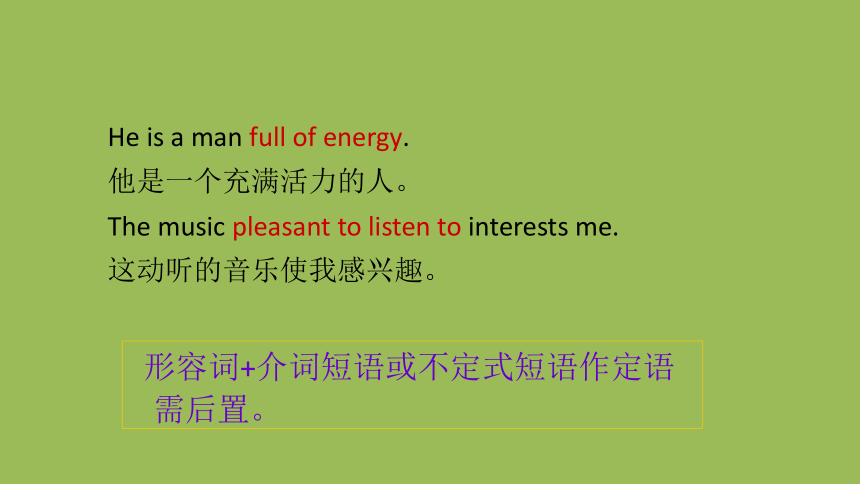
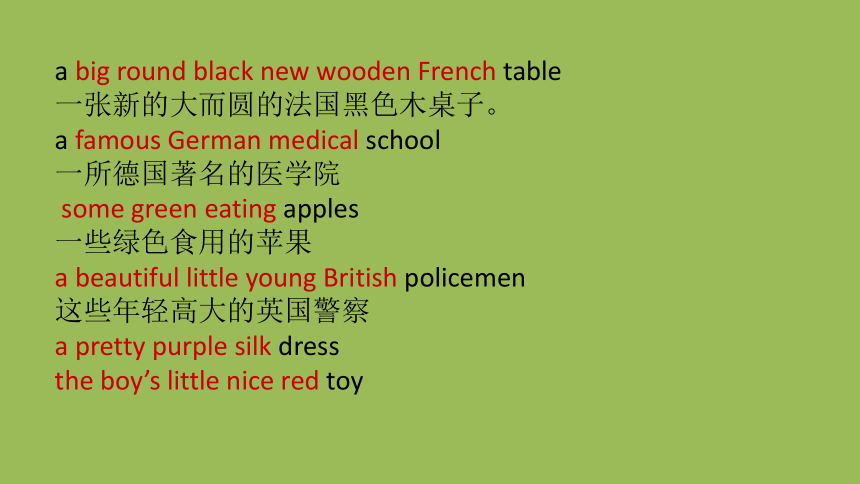
文档简介
(共41张PPT)
Unit 3
Life now and then
Module 3
Language in use
1. People are wealthier today, and they live longer than they did in the past.
2. But people don’t take as much exercise as they used to.
3. More people have cars, and they walk or use their bikes less.
4. We eat better and we live longer.
Observe
Are you familiar with these sentences They are all from this module.
形容词&副词
5. Mum, do you think that life is better today than in the past
6. Some people think life in the past was simpler and healthier than today.
7. And they sometimes work harder.
8. Do people work as hard as they did fifty years ago
9. I went everywhere on foot or sometimes by bike.
10. My daughter is really lucky.
11. But some of the shows are too noisy for me.
1. People are _______ (wealthy) today, and they live _______ (long) than they did in the past.
2. But people don’t take ______ much exercise _______ they used to.
3. More people have cars, and they walk or use their bikes ________ (little).
4. We eat _______ (well) and we live _______ (long).
5. Mum, do you think that life is _______ (good) today than in the past
wealthier
longer
as
as
less
better
longer
better
Have a try!
6. Some people think life in the past was _______ (simple) and _______ (healthy) than today.
7. And they _________ work ______ (hard).
8. Do people work _______ hard _______ they did fifty years ago
9. I went _________ on foot or sometimes by bike.
10. My daughter is _______ (real) lucky.
11. But some of the shows are too _______ (noise) for me.
simpler
healthier
sometimes
harder
as
as
everywhere
really
noisy
形容词是指那些用来描述或修饰名词(或代词)的一类词。一般放在其所修饰的名词之前。如:tidy, rich, cheap, early 等。
在句中用作定语、表语、宾语补足语等成分。
形容词的用法
作定语,常置于被修饰词的前面
He is a good actor.
他是一位好医生。
2. 作表语,置于连系动词后面
The baby is still asleep. Will you please make less noise
宝宝还在睡觉,你小声点好吗?
3. 作宾语补足语,置于宾语后面
Have you got everything ready for the meeting
你为这次会议做好准备了吗?
形容词在句中的作用及位置
alive, afraid, awake, alone, asleep等表语形容词作定语需后置。
Who is the greatest man alive
谁是当今最伟大的人物?
The baby still asleep might be awake very soon.
还在熟睡的婴儿可能马上就会醒来。
仔细观察下面句子,你能找到有关形容词的规律吗?
I have something important to tell you.
我有重要的事要告诉你。
Is there anything interesting in the film
电影里有什么有趣的内容吗?
There is nothing dangerous here.
这儿一点都不危险。
英语单词中something, anything, nothing等不定代词被形容词修饰时,形容词放在不定代词后面。
away,long,wide,high,deep,old等词附有数量词语说明时需后置。
The road is about 50 metres wide.
这条路大约50米宽。
The river is 30 metres deep.
这条河30米深。
He is a man full of energy.
他是一个充满活力的人。
The music pleasant to listen to interests me.
这动听的音乐使我感兴趣。
形容词+介词短语或不定式短语作定语需后置。
a big round black new wooden French table
一张新的大而圆的法国黑色木桌子。
a famous German medical school
一所德国著名的医学院
some green eating apples
一些绿色食用的苹果
a beautiful little young British policemen
这些年轻高大的英国警察
a pretty purple silk dress
the boy’s little nice red toy
多个形容词修饰名词的大体顺序是:
限定 描绘 大(小) (短) 高 (低)
形状 年龄 新 (旧) 老 (少) 颜色 国籍 出处 材料 作用
类别等 +名词
下面顺口溜有助于你记忆:
限定描述大长高;形状年龄与新旧;
颜色国籍和材料;用途类别往后靠。
副词用来修饰动词、形容词、其它副词、 全句或名词词组及句子的词。常用的有:ago,before,now,then,soon, already,yet, here, there, up, down, above, below, inside, outside, where, very, much, so, too, quite, enough, easily, quietly, also, too, only等。在句中用作状语、表语、定语、宾补等成分。
副词的用法
Our school is very beautiful.
我们的学校非常美丽。
It was rather hot that day.
He studies much harder now.
他现在学习更努力了。
仔细观察下面句子,你能找到什么规律?
副词修饰形容词、副词时,放在它所修饰的词的前面。
副词在句中的作用及位置
I don’t know him well enough.
我不够了解他。
The book is easy enough for kids.
这本书对孩子来说够容易了。
enough作为副词总是置于被修饰的形容词或副词后。
We haven’t enough food for you.
= We haven’t food enough for you.
我们没有足够的食物分给你们。
enough作为形容词时可位于名词前或者名词后。
形容词比较级、最高级的构成
构成 原级 比较级 最高级
一般在词尾加-er, -est tall long taller longer tallest
longest
以字母e结尾的词,在词尾加-r,-st fine late finer later finest
latest
重读闭音节词且词尾只有一个辅音字母,双写辅音字母再加-er, -est big thin bigger thinner biggest
thinnest
以“辅音字母 + y”结尾的双音节词,先把“y”改为“i”再加-er, -est easy friendly easier friendlier easiest
friendliest
多音节和部分双音节,在原级前加more, most interesting more interesting most interesting
不规则变化:
原级 比较级 最高级
good/well better best
bad/ill worse worst
little less least
many/much more most
far farther/further farthest/ furthest
old older/ elder oldest/ eldest
1. 规则变化:
1) 单音节的词在词尾直接加-er/-est,例如:
near → nearer/ nearest
hard → harder/ hardest
2) 部分双音节和多音节的词在词前加more/most,例如:
carefully → more/ most carefully
warmly → more/ most warmly
副词比较级、最高级的构成
2. 常用不规则变化为:
原级 比较级 最高级
well better best
badly worse worst
much more most
little less least
far farther/ further farthest/ furthest
The story gets more and more exciting.
故事变得越来越激动人心。
Our lives are getting better and better.
我们的生活越来越好。
比较级的句型
Ⅰ. 常用的比较级句型:
1. 比较级+than,表示“比……更……”
2. 比较级+ and + 比较级,表示“越来越……”
3. The + 比较级, the+比较级,表示“越……越……”
The more time you spend on it, the greater progress you will make.
你在这上面花的时间越多,你的进步就会越大。
The more he talked, the more excited he grew.
他越说越激动。
Health is more important than wealth.
健康比财富更重要。
He got up earlier than I did this morning.
今天早上他起得比我早。
同级比较一般采用as… as…句型,否定句可以用not so/as…as…表示。例如:
He is as tall as his father.
他和他父亲一样高。
She is as busy as before.
她和过去一样忙。
I get up not so early as you.
我不如你起得早。
最高级的句型
1. the + 最高级 + of/ in…
Ⅱ.常用的最高级表达:
Jim is the tallest of the three.
吉姆是三个人中最高的。
He is the most diligent student in his class.
他是班上最勤奋的学生。
2. 选择疑问句
It is the most interesting book I have ever read.
这是我所读过的最有趣的一本书。
3. the + 最高级 + 定语从句
Who is the tallest, Tom, Jack or Bill
汤姆、杰克和比尔,谁个子最高?
比较级和最高级的修饰语应置于其所修饰的形容词或副词之前。常见的比较级修饰语有much, still, a lot, even, far等。例如:
This is by far the most expensive bag in the shop.
这是目前这家商店里最贵的包。
常见的最高级修饰语有almost, by far, far, much等。例如:
He worked much harder than then.
那时他工作要努力得多。
比较级和最高级的修饰语
即学即练
一、用所给词的适当形式填空
1.(铜仁)With the help of my P.E. teacher, I run ________
(fast) than before.
2.(盐城)Millie tried her best but did (bad) among
all the members in the team.
3.(泰州) It's reported that the haze(霾) in February, 2014 is the
(serious) one these years in China.
(改编.扬州) Lucy is one of the __________ (tall) girls
in our class.
faster
(the) worst
most serious
tallest
5.She doesn't look as ________(happy) as her brother.Her
brother looks________(happy) than her.
二、单项选择
6.(绥化)He is ________at English than me.
A.good B.better C.best
【点拨】标志词法。根据than可知用比较级,故选B。
happy
happier
B
7.(杭州)My time in the middle school was one
of________periods of my life.
A. exciting B. more exciting
C. the more exciting D. the most exciting
8. (青岛)__D__we work at English,the better grades we will get.
A.Harder B. The hardest
B.Hardest D. The harder
D
9.(广东)Bob knows how to cut the cost of the project.
I'm sure he can do the work with ________ money
and ________ people.
A.less ;less B.fewer ;more
C.more ;fewer D.less ;fewer
D
【点拨】语境法。根据前面鲍勃知道怎样减少工程的成本可知应该是用更少的钱和更少的人。money是不可数名词,people作“人”讲时,本身为复数概念,less与不可数名词连用,fewer与可数名词复数连用,故选D。
10. (青岛)The talent show is ________ the game show.
I like both.
A.as boring as
B.not so bored as
C.as interesting as
D.not so interested as
C
Language points
1. In Victorian Britain, thousands of people came to the cities to work in the factories.
在维多利亚时代的英国,成千上万的人涌进城市,去工厂工作。
thousands of意为“成千上万的”。
Every day thousands of people visit the Great Wall.
每天有成千上万的人游览长城。
Men have been making music for thousands of years.
人类创作音乐已有数千年历史。
【拓展】
①hundred, thousand, million, billion等词前面没有具体的数字时,要在词尾加?s且与of连用。
Hundreds of people took part in the game.
成百上千的人参加了比赛。
②hundred, thousand, million, billion等词前面有具体的数字时,不能在词尾加?s,也不能与of连用。
There are three thousand students in our school.
我们学校有三千名学生。
(重庆中考)
The environment here becomes better and better. ____ birds are coming back.
A. Thousands of B. Thousand of
C. Thousands D. Thousand
点拨:可用语法分析法解答此题。thousand前没有数词时,后用介词of,thousand用其复数形式,表示的是模糊数字。故选A。
2. Instead of the green, open countryside, people lived in very small houses, very close to each other, with no space for children to play. 人们不是居住在绿树环绕、开阔的乡村,而是居住在拥挤的、没有地方供孩子们玩耍的很小的房子里。一天在外工作12个小时。
close to意为“靠近;离……近”。
“(be)near/close to+地点”意为“靠近某地”。
I live near/close to the factory. 我住在工厂附近。
Our school is close to a post office.
我们的学校离一家邮局很近。
【拓展】
close to还可以表示“与……关系密切”,强调关系或感情上“亲近的”。
I'm close to my Chinese teacher. 我和语文老师关系密切。
3. As a result, there were many illnesses. 结果,导致了许多的疾病.
(1) as a result意为“结果;因此”。
She worked hard. As a result, she got good grades.
她学习很努力,因此,她取得了好成绩。
【辨析】as a result与as a result of
I got up late today. As a result, I was late for school.
我今天起床晚了。结果,我上学迟到了。
I was late for school as a result of getting up late.
由于起床晚了,我上学迟到了。
as a result 副词短语,意为“结果”,常用于引出结果,位于句首,用逗号与句子其他部分隔开
as a result of 介词短语,意为“由于……的原因”,相当于because of, 后跟名词、代词等
(2)illness作名词,意为“病,疾病”。
He died after a long illness. 他久病不愈而亡。
【辨析】illness, disease与sickness
He’s away from school because of illness/sickness.他因病没来上学。
He has got heart disease. 他有心脏病。
Sickness often results from eating too much.呕吐常因饮食过量所致。
illness 强调疾病的种类时,为可数名词;强调生病的状况时,为不可数名词
disease 名词,通常指具体的“病”,为可数名词;也可指疾病的总称,为不可数名词
sickness 可泛指身体不适,还特指呕吐、晕船、晕车等
本节课主要学习了形容词和副词的用法以及知识点thousands of, close to, as a result和illness的用法。
Homework
1.熟记形容词和副词的用法及常用句型;熟记本课时的词汇。
2.完成本课时的课后作业
Unit 3
Life now and then
Module 3
Language in use
1. People are wealthier today, and they live longer than they did in the past.
2. But people don’t take as much exercise as they used to.
3. More people have cars, and they walk or use their bikes less.
4. We eat better and we live longer.
Observe
Are you familiar with these sentences They are all from this module.
形容词&副词
5. Mum, do you think that life is better today than in the past
6. Some people think life in the past was simpler and healthier than today.
7. And they sometimes work harder.
8. Do people work as hard as they did fifty years ago
9. I went everywhere on foot or sometimes by bike.
10. My daughter is really lucky.
11. But some of the shows are too noisy for me.
1. People are _______ (wealthy) today, and they live _______ (long) than they did in the past.
2. But people don’t take ______ much exercise _______ they used to.
3. More people have cars, and they walk or use their bikes ________ (little).
4. We eat _______ (well) and we live _______ (long).
5. Mum, do you think that life is _______ (good) today than in the past
wealthier
longer
as
as
less
better
longer
better
Have a try!
6. Some people think life in the past was _______ (simple) and _______ (healthy) than today.
7. And they _________ work ______ (hard).
8. Do people work _______ hard _______ they did fifty years ago
9. I went _________ on foot or sometimes by bike.
10. My daughter is _______ (real) lucky.
11. But some of the shows are too _______ (noise) for me.
simpler
healthier
sometimes
harder
as
as
everywhere
really
noisy
形容词是指那些用来描述或修饰名词(或代词)的一类词。一般放在其所修饰的名词之前。如:tidy, rich, cheap, early 等。
在句中用作定语、表语、宾语补足语等成分。
形容词的用法
作定语,常置于被修饰词的前面
He is a good actor.
他是一位好医生。
2. 作表语,置于连系动词后面
The baby is still asleep. Will you please make less noise
宝宝还在睡觉,你小声点好吗?
3. 作宾语补足语,置于宾语后面
Have you got everything ready for the meeting
你为这次会议做好准备了吗?
形容词在句中的作用及位置
alive, afraid, awake, alone, asleep等表语形容词作定语需后置。
Who is the greatest man alive
谁是当今最伟大的人物?
The baby still asleep might be awake very soon.
还在熟睡的婴儿可能马上就会醒来。
仔细观察下面句子,你能找到有关形容词的规律吗?
I have something important to tell you.
我有重要的事要告诉你。
Is there anything interesting in the film
电影里有什么有趣的内容吗?
There is nothing dangerous here.
这儿一点都不危险。
英语单词中something, anything, nothing等不定代词被形容词修饰时,形容词放在不定代词后面。
away,long,wide,high,deep,old等词附有数量词语说明时需后置。
The road is about 50 metres wide.
这条路大约50米宽。
The river is 30 metres deep.
这条河30米深。
He is a man full of energy.
他是一个充满活力的人。
The music pleasant to listen to interests me.
这动听的音乐使我感兴趣。
形容词+介词短语或不定式短语作定语需后置。
a big round black new wooden French table
一张新的大而圆的法国黑色木桌子。
a famous German medical school
一所德国著名的医学院
some green eating apples
一些绿色食用的苹果
a beautiful little young British policemen
这些年轻高大的英国警察
a pretty purple silk dress
the boy’s little nice red toy
多个形容词修饰名词的大体顺序是:
限定 描绘 大(小) (短) 高 (低)
形状 年龄 新 (旧) 老 (少) 颜色 国籍 出处 材料 作用
类别等 +名词
下面顺口溜有助于你记忆:
限定描述大长高;形状年龄与新旧;
颜色国籍和材料;用途类别往后靠。
副词用来修饰动词、形容词、其它副词、 全句或名词词组及句子的词。常用的有:ago,before,now,then,soon, already,yet, here, there, up, down, above, below, inside, outside, where, very, much, so, too, quite, enough, easily, quietly, also, too, only等。在句中用作状语、表语、定语、宾补等成分。
副词的用法
Our school is very beautiful.
我们的学校非常美丽。
It was rather hot that day.
He studies much harder now.
他现在学习更努力了。
仔细观察下面句子,你能找到什么规律?
副词修饰形容词、副词时,放在它所修饰的词的前面。
副词在句中的作用及位置
I don’t know him well enough.
我不够了解他。
The book is easy enough for kids.
这本书对孩子来说够容易了。
enough作为副词总是置于被修饰的形容词或副词后。
We haven’t enough food for you.
= We haven’t food enough for you.
我们没有足够的食物分给你们。
enough作为形容词时可位于名词前或者名词后。
形容词比较级、最高级的构成
构成 原级 比较级 最高级
一般在词尾加-er, -est tall long taller longer tallest
longest
以字母e结尾的词,在词尾加-r,-st fine late finer later finest
latest
重读闭音节词且词尾只有一个辅音字母,双写辅音字母再加-er, -est big thin bigger thinner biggest
thinnest
以“辅音字母 + y”结尾的双音节词,先把“y”改为“i”再加-er, -est easy friendly easier friendlier easiest
friendliest
多音节和部分双音节,在原级前加more, most interesting more interesting most interesting
不规则变化:
原级 比较级 最高级
good/well better best
bad/ill worse worst
little less least
many/much more most
far farther/further farthest/ furthest
old older/ elder oldest/ eldest
1. 规则变化:
1) 单音节的词在词尾直接加-er/-est,例如:
near → nearer/ nearest
hard → harder/ hardest
2) 部分双音节和多音节的词在词前加more/most,例如:
carefully → more/ most carefully
warmly → more/ most warmly
副词比较级、最高级的构成
2. 常用不规则变化为:
原级 比较级 最高级
well better best
badly worse worst
much more most
little less least
far farther/ further farthest/ furthest
The story gets more and more exciting.
故事变得越来越激动人心。
Our lives are getting better and better.
我们的生活越来越好。
比较级的句型
Ⅰ. 常用的比较级句型:
1. 比较级+than,表示“比……更……”
2. 比较级+ and + 比较级,表示“越来越……”
3. The + 比较级, the+比较级,表示“越……越……”
The more time you spend on it, the greater progress you will make.
你在这上面花的时间越多,你的进步就会越大。
The more he talked, the more excited he grew.
他越说越激动。
Health is more important than wealth.
健康比财富更重要。
He got up earlier than I did this morning.
今天早上他起得比我早。
同级比较一般采用as… as…句型,否定句可以用not so/as…as…表示。例如:
He is as tall as his father.
他和他父亲一样高。
She is as busy as before.
她和过去一样忙。
I get up not so early as you.
我不如你起得早。
最高级的句型
1. the + 最高级 + of/ in…
Ⅱ.常用的最高级表达:
Jim is the tallest of the three.
吉姆是三个人中最高的。
He is the most diligent student in his class.
他是班上最勤奋的学生。
2. 选择疑问句
It is the most interesting book I have ever read.
这是我所读过的最有趣的一本书。
3. the + 最高级 + 定语从句
Who is the tallest, Tom, Jack or Bill
汤姆、杰克和比尔,谁个子最高?
比较级和最高级的修饰语应置于其所修饰的形容词或副词之前。常见的比较级修饰语有much, still, a lot, even, far等。例如:
This is by far the most expensive bag in the shop.
这是目前这家商店里最贵的包。
常见的最高级修饰语有almost, by far, far, much等。例如:
He worked much harder than then.
那时他工作要努力得多。
比较级和最高级的修饰语
即学即练
一、用所给词的适当形式填空
1.(铜仁)With the help of my P.E. teacher, I run ________
(fast) than before.
2.(盐城)Millie tried her best but did (bad) among
all the members in the team.
3.(泰州) It's reported that the haze(霾) in February, 2014 is the
(serious) one these years in China.
(改编.扬州) Lucy is one of the __________ (tall) girls
in our class.
faster
(the) worst
most serious
tallest
5.She doesn't look as ________(happy) as her brother.Her
brother looks________(happy) than her.
二、单项选择
6.(绥化)He is ________at English than me.
A.good B.better C.best
【点拨】标志词法。根据than可知用比较级,故选B。
happy
happier
B
7.(杭州)My time in the middle school was one
of________periods of my life.
A. exciting B. more exciting
C. the more exciting D. the most exciting
8. (青岛)__D__we work at English,the better grades we will get.
A.Harder B. The hardest
B.Hardest D. The harder
D
9.(广东)Bob knows how to cut the cost of the project.
I'm sure he can do the work with ________ money
and ________ people.
A.less ;less B.fewer ;more
C.more ;fewer D.less ;fewer
D
【点拨】语境法。根据前面鲍勃知道怎样减少工程的成本可知应该是用更少的钱和更少的人。money是不可数名词,people作“人”讲时,本身为复数概念,less与不可数名词连用,fewer与可数名词复数连用,故选D。
10. (青岛)The talent show is ________ the game show.
I like both.
A.as boring as
B.not so bored as
C.as interesting as
D.not so interested as
C
Language points
1. In Victorian Britain, thousands of people came to the cities to work in the factories.
在维多利亚时代的英国,成千上万的人涌进城市,去工厂工作。
thousands of意为“成千上万的”。
Every day thousands of people visit the Great Wall.
每天有成千上万的人游览长城。
Men have been making music for thousands of years.
人类创作音乐已有数千年历史。
【拓展】
①hundred, thousand, million, billion等词前面没有具体的数字时,要在词尾加?s且与of连用。
Hundreds of people took part in the game.
成百上千的人参加了比赛。
②hundred, thousand, million, billion等词前面有具体的数字时,不能在词尾加?s,也不能与of连用。
There are three thousand students in our school.
我们学校有三千名学生。
(重庆中考)
The environment here becomes better and better. ____ birds are coming back.
A. Thousands of B. Thousand of
C. Thousands D. Thousand
点拨:可用语法分析法解答此题。thousand前没有数词时,后用介词of,thousand用其复数形式,表示的是模糊数字。故选A。
2. Instead of the green, open countryside, people lived in very small houses, very close to each other, with no space for children to play. 人们不是居住在绿树环绕、开阔的乡村,而是居住在拥挤的、没有地方供孩子们玩耍的很小的房子里。一天在外工作12个小时。
close to意为“靠近;离……近”。
“(be)near/close to+地点”意为“靠近某地”。
I live near/close to the factory. 我住在工厂附近。
Our school is close to a post office.
我们的学校离一家邮局很近。
【拓展】
close to还可以表示“与……关系密切”,强调关系或感情上“亲近的”。
I'm close to my Chinese teacher. 我和语文老师关系密切。
3. As a result, there were many illnesses. 结果,导致了许多的疾病.
(1) as a result意为“结果;因此”。
She worked hard. As a result, she got good grades.
她学习很努力,因此,她取得了好成绩。
【辨析】as a result与as a result of
I got up late today. As a result, I was late for school.
我今天起床晚了。结果,我上学迟到了。
I was late for school as a result of getting up late.
由于起床晚了,我上学迟到了。
as a result 副词短语,意为“结果”,常用于引出结果,位于句首,用逗号与句子其他部分隔开
as a result of 介词短语,意为“由于……的原因”,相当于because of, 后跟名词、代词等
(2)illness作名词,意为“病,疾病”。
He died after a long illness. 他久病不愈而亡。
【辨析】illness, disease与sickness
He’s away from school because of illness/sickness.他因病没来上学。
He has got heart disease. 他有心脏病。
Sickness often results from eating too much.呕吐常因饮食过量所致。
illness 强调疾病的种类时,为可数名词;强调生病的状况时,为不可数名词
disease 名词,通常指具体的“病”,为可数名词;也可指疾病的总称,为不可数名词
sickness 可泛指身体不适,还特指呕吐、晕船、晕车等
本节课主要学习了形容词和副词的用法以及知识点thousands of, close to, as a result和illness的用法。
Homework
1.熟记形容词和副词的用法及常用句型;熟记本课时的词汇。
2.完成本课时的课后作业
同课章节目录
- Module 1 Travel
- Unit 1 We toured the city by bus and by taxi
- Unit 2 It's a long story.
- Unit 3 Language in use
- Module 2 Education
- Unit 1 They don't sit in rows.
- Unit 2 What do I like best about school?
- Unit 3 Language in use
- Module 3 Life now and then
- Unit 1 They sometimes work harder.
- Unit 2 I think life is better today.
- Unit 3 Language in use.
- Module 4 Rules and suggestions
- Unit 1 You must be careful of falling stones.
- Unit 2 we must keep the camp clean.
- Unit 3 Language in use.
- Revison A
- Module 5 Look after yourself
- Unit 1 We'd better get you to hospital.
- Unit 2 Get off the sofa!
- Unit 3 Language in use.
- Module 6 Eating togethe
- Unit 1 When is the school-leavers' party?
- Unit 2 Knives and forks are used for most Western
- Unit 3 Language in use
- Module 7 English for you and me
- Unit 1 Have you ever been to an English corner?
- Unit 2 We all own English.
- Unit 3 Language in use
- Module 8 My future life
- Unit 1 Here's to our friendship and the future
- Unit 2 I know that you will be better at maths.
- Unit 3 Language in use
- Revison B
